
TOP OF THE POPS
Gary Howard’s 35 years in music
ARTISTS
IN RESIDENCE Electronic Music Report 2025 BEHIND
THE SCREENS
Latest developments in the screen and video sector
SULTANS
OF SWING Türkiye Market Report









Gary Howard’s 35 years in music
IN RESIDENCE Electronic Music Report 2025 BEHIND
Latest developments in the screen and video sector
OF SWING Türkiye Market Report








ILMC 37: The Report
We look back on some of the sessions, highlights, and nautically themed shenanigans that took place during the 37th International Live Music Conference
Artists in Residence
Carl Loben provides our annual health check of the electronic music sector 46 Top of the Pops
Pop monarch Gary Howard celebrates 35 years in the music business 58 Behind the Screens
Derek Robertson dives into the cuttingedge innovations, logistical challenges, and fierce competition defining the highstakes video and screens business
62 The Secret of Success
Hanna Ellington goes behind the scenes of Gracie Abrams’ The Secret of Us Tour
70 Sultans of Swing
Adam Woods speaks to some of those at the sharp end of the business in Türkiye for his latest market report
Financial Solutions
Etiksha Patel outlines five key banking tips for touring artists
Over Policed & Under Threat
Dr Charisse Beaumont discusses over-policing and licensing bias at Black and ethically diverse events
Members’ Noticeboard
ILMC members’ photographs
What was your favourite highlight at ILMC37?
Delegates share their stand-out memories from the recent event
Thousands of professionals read IQ every day. Make sure you get the whole picture…


The ILMC 37 research vessel has successfully docked after hosting more than 1,600 nautical enthusiasts during its 25–28 February voyage to the very epicentre of the live music industry. The feedback we’ve had from those who joined us aboard was that the journey was smooth, and the international agreements that were navigated should help to keep the international live entertainment business afloat until we meet again in 2026.
Superstruct chief James Barton took the hot seat for a fascinating interview with ILMC skipper, Cap’n Greg Parmley, while the most packed conference programme in the event’s history saw experts from around the world tackling topics as diverse as marketing, ethics & activism, insurance, gender-balanced lineups, grassroots touring, crew welfare, superfans, genre spotlights on afrobeats, electronic music, and classical & orchestral, and a strand dedicated to the burgeoning Middle East.
ILMC Futures Forum welcomed an additional delegation of emerging executives, while the one-day Touring Entertainment LIVE meeting welcomed professionals from across the family show and touring exhibition sector. And whether it was Emma Banks’ appearance as a sea goddess at the annual Arthur Awards or Moby and Declan McKenna discussing activism and music during the Green Events & Innovations Conference, the talking points from our four-day gathering reinforced ILMC’s irreverent approach to dealing with serious industry issues.
It’s been three years since ILMC moved to its new home at the Royal Lancaster Hotel, allowing delegate numbers to grow, and it’s testament to our members that the global live entertainment business has continued to enjoy rude health – so much so that 2,500 professionals now take part in ILMC week, as well as 1,000 music fans who mix with delegates at our Soho Calling showcase event.
As usual, we must say a huge thank you to all our sponsors for their generous support and to the moderators and speakers who donated their time and expertise to the various panels to make ILMC 37 a great event.
The following pages features panel and event highlights, photographs, and comments from the worthy winners who took home an Arthur Award at this year’s gala dinner.
If you made it to London for any of the events during ILMC week, a massive thank you for making the effort. And if you were unable to attend, we’ll be launching ILMC 2026 in the autumn.
Stay tuned to discover the theme for our 38th outing...




Tuesday saw delegates of the 17th edition of the Green Events and Innovations Conference (GEI) gather to discuss the latest developments in the fight to make the live entertainment sector more sustainable.
Organised by A Greener Future (AGF) in partnership with ILMC, GEI’s headline session, Act 1.5 and Beyond, focused on the groundbreaking work of Massive Attack and their collaborators, following their huge proof-of-concept show in Bristol, England, last year, as well as the challenges faced by the city of Liverpool, which was awarded UN Accelerator City status last year.
“The theory and critique were important, but we didn’t want to just produce reports… [the idea was to] bring as many identities together and create a proof-of-concept show,” Act 1.5 producer Mark Donne told GEI. “We know it works; we know fans want to do it and buy into it. But how do you begin to proliferate this stuff? How do you scale it? How do you work with government and authorities?”
“We went about it by initially developing this super-low carbon live music roadmap, which was setting out some targets for different areas of emissions,” explained professor of climate and energy policy Carly McLachlan, who co-authored a report reviewing the performance of the Act 1.5 show. That document concludes that Act 1.5 “demonstrated that it is possible to run a significant outdoor event entirely from batteries without any diesel generator back up.”
Earlier, the opening Food & Drinks: Impacts & Emotions – The Cow in the Room session heard that F&B has long faced resistance from profit-driven companies and event audiences who are hesitant to attempt plant-based alternatives that would greatly reduce their carbon footprints.
“There wasn’t much choice when it came to food and beverage 20 years ago, but what we’ve noticed over the past five to eight years, especially from the younger generation, is a huge drive towards wellness and understanding the provenance of product,” stated Adam Hempenstall of festivals and events bar operator Peppermint.
While the focus of the Events in the New Climate: Damage Limitation panel was on January’s devastating wildfires in Los Angeles, Megan Best of Native Events recalled her experiences being at festivals such as Forever Young in Ireland (which was forced to partially close in 2023 due to muddy conditions) as an example of the ruinous effects extreme weather can have.
“These extreme weather events are tough enough for us when it comes to the human and financial cost, but there’s a huge natural cost as well,” she explained, adding that we have quickly gotten used to “enduring more intense tropical rainfall over the last decade.”
GEI’s keynote session saw electronic music legend Moby and ascendant singer-songwriter Declan McKenna tackling a plethora of topics ranging from the creative process to the trials and tribulations of activism.
McKenna noted that the burden on young artists in particular can be intense. “The main thing that it boils down to in terms of protecting artists is that while there’s so much change, they need to be allowed to make art in a way that’s natural to them, so that they can grow organically and not feel this immense pressure that turns them into something they’re not,” he said. “With so many methods of self-promotion such as TikTok and other social media platforms, they need to remember to exercise those strategies with caution. However, if constantly promoting on TikTok has worked for them, then maybe just leave them to their devices.”
Reflecting on the aftermath of the LA wildfires, Moby said, “I saw a side of people I’d never seen before. Pure altruism. The scope of the devastation was so much worse than what was reported. The Palisades and Altadena were gone, tens of thousands of homes and buildings reduced to rubble, cars melted, engine blocks turned to melted metal, but only two things didn’t burn in Altadena: the trees and grapefruits. Hopefully, there’s a lesson to be learned in that everything we build can be destroyed, but nature has this inherent sort of encoded mechanism by which it survives.”
And addressing the current state of play on animal agriculture, he added, “[It’s] the single most destructive entity that humans ever invented... If we give up animal agriculture, we reduce climate change by 30%, we reduce healthcare spending by 60% to 70%, we prevent almost all pandemics, we end rainforest deforestation, we almost end ocean acidification, and we end plastics in the ocean by about 50%. An alien would ask us, ‘Why do you keep sustaining and subsidising an industry that destroys everything it touches?’ And I’d answer that we’re idiots.”

culture minister

As ILMC 37 got properly under way, the UK culture minister, Chris Bryant, gave a candid speech about his passion for concerts and outlined the government’s music priorities.
In the wake of the Labour Party’s election victory last summer, Bryant explained that he had been tasked with devising a ten-point plan for music. “It’s already a 27-point plan, which I hope we’ll be able to publish in June,” he said. “One of the reasons that this industry has flourished so phenomenally in recent years is, of course, artists are going back on stage, and I’d like a bit more of a mix… there are artists who are performing [that are] much older than me. It would be nice if more of the younger artists were able to take those big stages and those big arenas, and part of that is making sure that there’s a proper remuneration for them in the era of streaming, and that’s one of the things we’re working on.”
Explaining government enthusiasm for a voluntary ticket levy to support the grassroots music sector, Bryant said, “I’m really hopeful that we’ll be able to do this because I’ve always believed that music, like all the creative industries, is an ecosystem. You only get the Paul McCartneys and the Elton Johns if you also have the people right at the start of their career coming on in every single generation.”
And delivering good news about rules to clamp down on touts, he reported, “We’ve got a consultation that’s ongoing on how to tackle the secondary ticketing market in the UK, and we’re determined to make it fairer for fans.”
The traditional Open Forum curtain raiser, hosted my CAA’s Maria May, took a deep dive into ticket prices, grassroots, and changing audience tastes – plus the emergence of India as a concert and event destination.
In her introduction, May noted it had been a “great year for some” but a “hard year for others” and questioned whether the business needed to refresh its ideas.
UTA partner and co-head of global music Sam Kirby Yoh observed a shift in the tastes of the younger demographic. “The audience is moving away from wanting the festival experience. [...] They want to actually have the full two-hour-plus experience, seeing their favourite artists for £100 versus going to the festival for £500,” she said.
Responding to May’s question on whether the industry is becoming “smarter” at pricing tickets, DF Concerts CEO Geoff Ellis noted, “We’ve
got to get better – and we are getting better – at pricing the house. You’ve got an entry-level ticket and a premium price ticket, so you might be paying £150 for the best seats, but those people would go on to the secondary market otherwise – if you price the whole house at £75, you’re under-pricing them, and the artist should be getting that money.”
FKP Scorpio CEO Folkert Koopmans raised concerns over the festival market. “People don’t want to spend €250–300 for a festival ticket anymore,” he warned. “I think it’s also got to do with the change in the community, that during the pandemic… we kind of lost the generation.”
Moving on to emerging markets, Ashish Hemrajani, founder and CEO of Indian entertainment giant Big Tree Entertainment, referenced recent successes, including Coldplay’s record-breaking Ahmedabad concerts, and predicted the Indian market would balloon by a factor of ten in the next five years. However, he added, “Infrastructure continues to be a challenge, and we’re trying to solve that as you build more routing around Middle East and Southeast Asia, because the timing works. It’s the same time of the year, from October to March, April, when you can tour in the Middle East and Southeast Asia.”
Elsewhere, top European festival organisers came together to discuss the changing tastes of fans and how their events are vying to stand out in an increasingly competitive live music market.
Discussing whether younger music fans prefer a one-day event to a multi-day festival, Sziget’s Virág Csiszár noted a change in ticket-buying behaviour for the Budapest-based event. “Younger people are not really interested in the whole [six-day] package anymore,” she said. “We try to convince them to not only come for specific artists but to enjoy the whole experience [by providing] exciting stuff.”
However, AEG’s Jim King – whose portfolio includes All Points East, BST Hyde Park, and Lido – argued that both single-day and multi-day festivals have their place for Gen-Z but that a strong identity is key.
“They’re two different things, and they’re both relevant, but they should be marketed differently,” he said. “You’re trying to create a different environment, and I think it’s important to achieve that.”
Indeed, greenfield festivals are stepping up their camping offering to attract the newer generation of festivalgoers. “Expectations for camping are a lot higher now; it has to be more than a tent and some grass,” observed Rock am Ring’s Jana Posth.

Festival execs lined up to share insights about the sector during Festival Focus: Survive & thrive










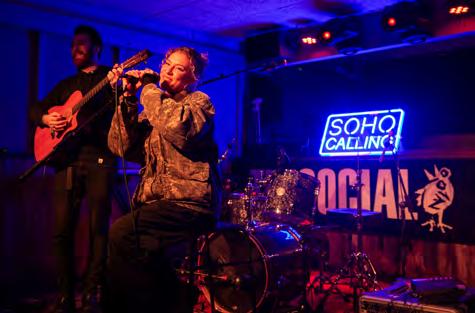
Food & beverage at festivals was also under review. Acknowledging that bar-spend may be less among Gen-Z, King highlighted other revenue opportunities associated with that generation. “Our sponsorship numbers are the best we’ve ever seen for every single show that we do, and they extend even further when we get into the Gen-Z audience,” he said.
However, the discrepancy in artist fees for touring and festivals is the single biggest issue for festivals according to the AEG Presents veteran. “You go back five, maybe seven years, and there was a marked difference between a major outdoor show where you have concessions – and therefore, other forms of revenue – and a concert,” King told delegates. “Now parties can make much more from headline shows, and that’s become a major challenge to the festival industry.”
Other key debates on the opening day of the conference included an intriguing Ethics & Activism conversation, a workshop on live music insurance, a fan focus group, and an electronic music session run by the International Music Summit (see page 38), while Superstruct chairman James Barton took the day’s keynote slot (see page 32).
Wednesday’s conference activities also saw Touring Entertainment LIVE running in conjunction with ILMC.
Attendees discussed such issues as how to navigate emerging markets such as India, Latin America, and the Middle East, while the event’s keynote session saw Sony Music Masterworks president Mark Cavell and Fever SVP Mariano Otero sharing the stage, along with host James Drury.
Having laid out his vision to enlarge Sony Music Masterworks’ live

Sony Music Masterworks’ Mark Cavell & Fever’s Mariano Otero sat down for the TEL keynote
division, Cavell revealed his wish to introduce more niche markets to an industry whose tastes continue to diversify – especially for an increasingly open-minded younger audience.
“Alongside the family entertainment space, we’re also leaning heavily towards anime and gaming in our repertoire,” he said, noting how genres such as K-pop and J-pop have seamlessly entered into today’s Western cultural landscape.
Fever has grown into a marketing and entertainment behemoth now valued at $2bn, with Otero noting that data has been a key component in its success through online marketing tool Secret Media, which acts as a viral city guide at 120 locations around the world.
“We have around 300m monthly interactions between Secret Media and our visitors, which gives us plenty of data to test out a hundred different concepts every week,” he revealed. “We use Secret Media to scope out what’s going on in a particular city, identify what types of entertainment have a higher potential demand, and explore other areas of the business.”
Applauded by Cavell, one of Fever’s major success stories has been its Candlelight concerts, which offer intimate live performances by local musicians in a candlelit setting. Originally focused on classical music, the series has expanded to include jazz, pop, and film scores and is now featured in over 200 cities, attracting 5m attendees.
“To no surprise, the 25–35 demographic wasn’t buying live classical music concert tickets, so we started experimenting with different assets and combined the idea of hosting those concerts inside these intimate, candle-lit settings,” said Otero. “All of a sudden, we’re seeing younger people take their dates to Candlelight. The concept created an entirely brand-new market for us.”

Tim Chambers led a discussion on one of the hottest issues in the business – ticketing



Thursday’s activities included a tranche of sessions devoted to the venue sector, with executives from OVG, ASM Global, Live Nation, and Grupo Quality providing insight into new markets, capital city residencies, and the impact of 2025’s huge stadium summer on arenas.
Noting development in Africa, OVG’s Rebecca Kane Burton highlighted the company’s investment alongside Live Nation in Lagos, Nigeria, while Live Nation’s Tom Lynch discussed their new live entertainment space, The Dome, in Johannesburg, South Africa.
“It’s an emerging market, not without its challenges to build new venues, to open venues, etc, but we’re seeing international artists starting to play there,” stated Lynch. “We’ve got Tems in a few weeks and Central Cee’s going down there, but then a huge domestic talent pool as well… Johannesburg’s somewhere we see a huge future.”
ASM Global’s Marie Lindqvist, meanwhile, spoke of ongoing projects in Italy, Spain, and Portugal, as well as the UK. “We’re involved in two new builds outside Milan: one in Bergamo and another project in Cantù. Here in the UK, it’s such a big market if you compare it to the rest of Europe, so we’re opening up in Derby in just a few weeks.”
Further south, Ignacio Taier of Argentina-based Grupo Quality referenced a recent agreement by Live Nation and subsidiary DF Entertainment to operate Buenos Aires’ Luna Park. “There’s a need for more venues everywhere, and Latin America in general,” he said. “We have seen more venues in Colombia, Brazil, and other places, so I think that’s a constant.”
However, Lynch suggested the market was still currently underserved in terms of mid-size venues. “I sat on [the ILMC] stage in the old hotel five years ago and talked about that gap in 4,000–5,000-cap rooms, and we’ve not really moved on a huge amount,” he observed. “When we look across Europe, actually, there’s that huge gap still. We’ve got plenty of large-scale clubs here in the UK, the US is coast to coast, and France is okay. But in every other country, you tend to have 2,000-cap theatres and then an arena, so artists are trying to do two-, three-, four-night runs to fulfil the needs of their fans, and that’s not necessarily very efficient.”
Venue development was also a topic during ILMC’s Middle East focus sessions, where leading executives from the region delved into the


issues impacting a business that continues to report record growth.
Chaired by CAA’s Emma Banks, Middle East Live: States of growth saw Platinumlist’s Cosmin Ivan revealing an 800% increase in popularity for hip-hop across the region, a marked rise in attendees for Arabic and international live music concerts, and a wildly different “ticketing culture” compared to the West.
“Eighty percent of sales sometimes occur in the last three days prior to an event, which does cause some slight panic from organisers unfamiliar with the region,” he said.
Noting the surge in demand for events, OVG’s Iain Campbell told delegates, “Seventy percent of Saudi Arabia’s population are younger than 35 years old and are more digitally aware than previous generations, so there is a real push to change the perception of the KSA as a hub of vibrancy and enthusiasm to outsiders unfamiliar with the country.”
All Things Live exec Thomas Ovesen emphasised the importance of changing the framework in the grassroots scene. “Historically, the top Arabic artists generate most of their revenue via their records, so there’s no incentive for them to perform live shows,” he said. “It’s a new thing for Arabic audiences to get accustomed to paying to see local talent on stage as opposed to seeing them for free playing at a wedding, for example, and one way to change this model is to have Western promoters getting their artists to showcase more domestic sup -
War Child, a charity focused on safeguarding children affected by conflict, was this year’s fundraising beneficiary

porting acts.”
Regional governments’ roles in supporting the ever-growing live entertainment scene were also detailed. “September 2025 will mark the first time that public schools in Saudi Arabia will have a music curriculum,” said Saudi Arabia’s Music Commission CEO Paul Pacifico, whose role as the head of the country’s musical commission saw 9,000 teachers hired to head up this historic programme.
“Because of a shift in working culture compared to a decade ago, there are less people leaving in the summer as you’re expected to work all year, so we’re focusing on building more indoor venues and showcasing more Arabic content during the summer so that families will have something to do even during a normally quiet off-season,” Pacifico added.
Pulling in the biggest audience of the day, some of the team behind Coldplay’s ongoing record-breaking Music of the Spheres Tour detailed the band’s achievements, as well as applauding their leadership in trying to cut the carbon footprint of touring.
“The tour has also been heralded and recognised by climate action leaders around the world for its efforts in sustainability, which has led to a 59% reduction in CO 2 emissions over the first two years of the tour,” noted moderator Ruth Barlow of Beggars Group.
The band’s agent, Josh Javor of WME, production manager Chris Kansy, and Live Nation promoter Phil Bowdery were joined by Laura Coroianu of Romania’s Emagic.
So far, Music of the Spheres has been seen by 10.3m people and grossed an estimated $1.14bn, but Javor suggested it was the former statistic that took priority.
“The important thing for the band is that every single ticket is sold, and everyone can afford to come to the show,” he said. “Having the accolade of the highest-grossing tour of all time is not something they’re necessarily interested in… They want to have the tour that the most amount of people came to see.”
Tantalisingly, Live Nation promoter Phil Bowdery said: “We’re not finished yet,” as Javor crossed his fingers, when asked about the possibility of further tour dates.
Javor disclosed that the band actively investigate territories where they could take the production. “We will get messages because
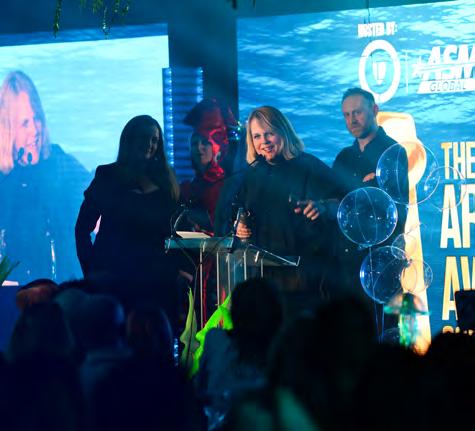
they’ve seen something on their social media that they want us to look into,” he explained, adding that the band’s two gigs at Bucharest’s 53,000-cap Arena Națională in June 2024 arose simply from never having played in Romania before.
Local promoter Laura Coroianu, whose Emagic operation organised the shows, suggested the concerts represented a victory for perseverance. “We’d been sending offers in since about 2010,” she laughed. “What was very important for Romania is it was the first time a show sold out basically the minute it was put on sale. That never happened before. We were flabbergasted.”
PM Chris Kansy talked through the band’s key sustainability practices. “We started off doing the easy stuff – the stuff that anybody could do: no plastic, trying to keep food waste down,” he said. “But the meat and potatoes, no pun intended, behind the whole thing is how we power the show with BMW batteries. All of our shows are powered by batteries. And that’s not just part of the show; it’s all of the show.
“We do have to use generators to some extent to charge the batteries when we can’t use sustainable house power, but we run our generators a fraction of what a normal show would and, more often than not, run HVO fuel.
“And then, of course… we’ve got our energy floors, where fans actually jump on the suspended rubber floor and the kinetic energy charges batteries. We’ve got solar that we lay out at the front of house. We’ve got solar that we lay out at the seats behind the stage. Those all charge batteries.”
Bowdery praised the contribution of Live Nation sustainability manager Ariel Bojeun, who is on the road with the band for the entirety of the tour. “In whatever city they’re going to, Ariel will be doing her job to make sure that she’s contacting all the local bus services and train services so that they can push on the Coldplay website the most sustainable way of getting to the gigs,” he said.
“Ariel will make sure that even from crew catering, there’s no food wasted in any way, shape, or form. If there is anything left, it goes to a local charity or local food house. So Ariel’s job is very complex and time-consuming, but she makes sure that everything works on the sustainability side.”




Execs made a case for the world’s most compelling new tour stops during The ‘Real’ World Tour


ILMC Futures Forum welcomed a record number of delegates to London’s Royal Lancaster Hotel on 28 February to discuss the evolution of the live music business.
More than 500 next-generation business leaders and senior executives from ILMC gathered for dynamic discussions on emerging markets, booking strategies, alternative revenue streams, and more.
This year’s blockbuster keynote saw Amy Taylor – frontwoman of Australian punk rockers Amyl and the Sniffers – recount how the band skyrocketed to global acclaim. Taylor dug into the cost of touring, keeping audiences safe, and the importance of artist involvement with BBC Introducing’s Abbie McCarthy to close out the final day of ILMC 37 (see page 34).
Festival Forum: New booking strategies proved to be the most popular session of the day, with young execs from Superstruct, Rock For People, FKP Scorpio, and DTD Concerts discussing how they strike the perfect balance on their bills.
Returning sessions at this year’s Futures Forum included Meet the New Bosses, which heard from four of the young execs recognised on IQ’s latest New Bosses List, and the ever-popular music-sharing session Now That’s What I Call 2025
The long-running Soapbox Sessions also returned with six snappy presentations delivered by innovators, thought leaders, and inspiring

individuals across the business. ITB’s Lucia Wade discussed how Måneskin became a next-generation headliner, Openstage’s Rob Sealy gave the lowdown on Lana Del Rey’s game-changing Fenway Park presale, and Butlins’ Mike Godolphin revealed the value of residential music weekenders.
The second tranche of bite-sized presentations saw AGF’s Claire O’Neill go behind the scenes of Massive Attack’s Act 1.5 and discuss the future of battery-powered events, EXIT’s Ana Marković unpack the festival’s award-winning campaign on digital addiction and mental health, and Saskhia Menendez lay out the industry’s next steps for DEI.
There was no standing room for The Venue Evolution, which saw the brightest young minds from ASM Global, Royal Albert Hall, and The O2 debate the future of the sector. Elsewhere, Tour Marketing: The industry’s secret weapon gave delegates an insight into how agency tour marketing departments influence the success of artists’ live campaigns. Fan data, marketing, promotion, press, ticketing, and sponsorship were focus areas in this new session.
Other topics covered in the Futures Forum programme included emerging markets (The ‘Real’ World Tour), alternative revenue streams (Show Me The Money), and career development (Rob My Job).
In addition to conference sessions, delegates were offered the chance to take part in mentoring sessions and networking opportunities such as The Pop Pub Quiz
Futures Forum delegates took advantage of mentoring opportunities during the Meet Your Mentor sessions
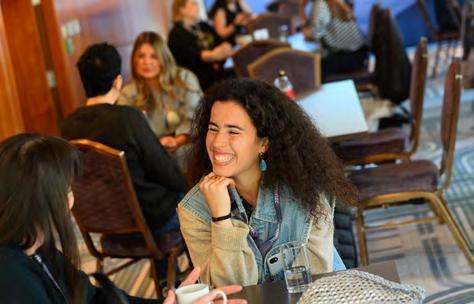
Four industry figureheads candidly recounted their careers and answered audience questions Panellists discuss the evolution of venues
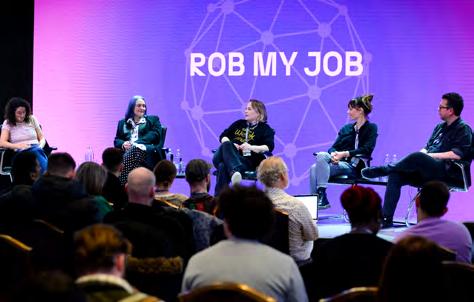




(FOR OUTSTANDING CONTRIBUTION TO THE INDUSTRY)
The last thing I ever expected was to win The Bottle Award at ILMC. For a guy that can talk his ass off, I was speechless.
I’ve been going to ILMC since its beginning. I did this because I thought it was important to have someone from Lat Am there, and it was (and is) truly the only international live conference with delegates from around the world that face similar challenges as my region. It has never been a USA-centric agenda but a world agenda. And, over the years, ILMC was the first conference to pay attention to and support Latin America. I felt at home at ILMC.
All that said, I always had in mind the fact that the Lat Am delegates were a small contingent within ILMC. Given this, the chance of a Latin promoter winning an award were slim to none because we’d never get enough votes. I was resigned to this.
Given the above, when my name was announced – and it wasn’t till the end of Martin Hopewell’s amazing intro that I realised, “Oh! It’s me!” – I was totally blown away. Since I was speechless, I was not able to say a few things I would have wanted. So here goes…
An immense thank you to ILMC and all who supported me for this recognition of my career, but also, more importantly and by extension, the recognition of the development of the South and Latin American markets. That meant so much to me.
Phil Rodríguez | Move Concerts
(MOST PROFESSIONAL PROFESSIONAL)

I am incredibly honoured to be awarded the Arthur Award for Most Professional Professional and so grateful to everyone in the industry that voted for me. This recognition is not just a personal achievement but a testament to the wonderful support and collaboration of my colleagues at ASM Global. I also want to say congratulations to the other nominees and award winners and thanks to ILMC for hosting a really special event.
Freyja Handy | ASM
Global
(SECOND LEAST OFFENSIVE AGENT)

It’s an honour to receive this award. I’ve raised a few glasses at previous Arthurs to some legends in the game and even a few mentors who have won various categories over the years, so to win is a little surreal. Thank you to ILMC and all those that voted. It’s an exciting time to be in the live music business, and it feels like there is something to be learned every day. The appetite for shows seems to be at an all-time high, and if we can balance costs and ticket prices, we have some great years ahead. We have a lot of incredible people at WME, and I’m proud to work within such a driven and dedicated team.
Chris Payne | WME
(THE UNSUNG HERO)

Winning this award was an incredible surprise and a true honour. Being alongside such esteemed peers makes this moment even more meaningful.
A heartfelt thank you to ILMC, the jury, and everyone who voted – this award is not just a personal achievement but a milestone for the event safety sector as a whole. I share it with my dedicated colleagues at the YOUROPE Event Safety Group, who have spent with me over 20 years working to make festivals safer and more welcoming.
A special mention to my esteemed friend Chris Kemp, whose unwavering support and insights have been truly inspirational on this journey. I am also deeply grateful to Daniel Rossellat, founder and director of Paléo Festival Nyon, for his trust throughout the years. And to my incredible team – your passion and commitment to delivering an outstanding festival experience year after year is nothing short of remarkable. You are all champions!
Pascal Viot | Paléo Festival Nyon


(THE GOLDEN TICKETER)

It’s a fantastic honour to receive The Golden Ticketer Award. This truly belongs to the whole team at Ticketmaster. I’m so lucky to work alongside such a talented bunch of people – the best in the business. It’s been another incredible year for live events, and we’re grateful for the part we get to play in that.
Andrew Parsons | Ticketmaster
(THE PEOPLE’S ASSISTANT)

It’s such an honour to receive this award, and I’m incredibly grateful to all who voted. It’s a privilege to work at SJM, particularly with Simon, and being recognised for that work by my peers feels like a great accomplishment. A huge thank you to all the incredible people I work with at SJM and in the wider industry, and congratulations to all other nominees and winners.
Louise Thomas | SJM Concerts
(FIRST VENUE TO COME INTO YOUR HEAD)

On behalf of the entire Sphere team, we are honoured to receive this award. We've only been open for a year and a half, so to be the first venue that comes into your head means a lot.
This award is a testament to how Sphere has captured the world's attention with what's happening both inside and outside the venue. The artists that have performed at Sphere have each used the venue in their own way to redefine what a live experience can look, feel, and sound like, and we can't wait for you to see what's next.
Thank you again for recognising Sphere and the efforts of our team. None of this would be possible without their commitment to doing what's never been done before.
Josephine Vaccarello | Sphere
(TOMORROW’S NEW BOSS)

It’s an absolute honour to have even been shortlisted for the young executive award, let alone win it! It’s been an amazing six years at AEG, with challenges, growth, and unforgettable moments, and I couldn’t have gotten this far without everyone’s continued support and guidance over the years. To everyone who has supported me, I want to say a huge thank you – especially to my team, my mentors – Steve Homer and Holly Scanlon – and everyone at AEG Presents. Bring on the next chapter!
Chloe Cura | AEG Presents

(LIGGERS’ FAVOURITE FESTIVAL)

Winning the Arthur Award as we celebrate 40 years of Rock in Rio in Brazil and 20 unforgettable years in Lisbon is more than an honour – it’s a powerful reminder of music’s ability to transform lives. This award belongs to everyone who believes in the magic of festivals.
Festivals are more than just music and performances; they are gatherings of souls, emotions, and shared dreams. Here, there are no differences, no borders – only connection. It doesn’t matter where you come from, who you are, or how you express yourself. What truly matters is the energy that ignites when thousands of voices sing together, when music unites strangers, transcends genres, and turns fleeting moments into eternal memories. Festivals shape history, and this is why we must never stop believing in their power.
We dedicate this award to our fans, who inspire us to keep pushing boundaries, to our partners who make the impossible happen, to the artists and agents who bring this journey to life, and above all, to our tireless team for dreaming big and making it happen.
Thank you to everyone who voted for Rock in Rio and to ILMC for this incredible recognition. This award is for all of us!
Luís Soares | Rock in Rio
(SERVICES ABOVE & BEYOND)

It’s always an honour to receive an Arthur Award – it’s a lovely recognition for our dedication – and a fun evening!
Thanks to our team of drivers, office staff, workshop, and build shop for their fantastic work, and of course, thanks to our clients for voting for us.
Jörg Philipp | Beat The Street
(THE PROMOTERS’ PROMOTER)

To be nominated in this category and eventually win this Arthur Award is very special. It is a huge reward, and I am very grateful for the recognition and appreciation from my peers. Thank you all for your support.
I really feel blessed to be working in this industry, having so much fun in what we do behind the scenes for the ultimate experience for fans and artists. Music gets my mojo working.
Kim Bloem | Mojo Concerts


USE OUR SOHO CALLING QR CODE TO SEE A SNIPPET OF THE ACTS WHO PERFORMED AT THIS YEAR’S SHOWCASE
For decades, Soho has been the beating heart of London’s music culture, nurturing legendary artists and hosting groundbreaking performances that have shaped the global music landscape. ILMC's music showcase –rebranded as Soho Calling for its third edition – honoured this fabled district, bringing hundreds of delegates and thousands of fans to intimate venues for an unforgettable event.
Twenty emerging artists performed across six of Soho's most iconic stages: The 100 Club (presented by Music Venue Trust), 21Soho (in association with Amplead), The Lower Third (presented by DIY Magazine), Phoenix Arts Club, The Social, and The Forge. With rave reviews, the success of the event signifies this element of the ILMC programme is here to stay.
ADMT
ALIEN CHICKS BLUAI CHLOË'S CLUE CORDELIA ESSENCE MARTINS FIG TAPE GIIFT KAI BOSCH LLEO LOLA MOXOM LOUIS OLIVER MONSTER FLORENCE :PANIC :OVER PUNCHBAG REALLY GOOD TIME SAVANA FUNK THE MOLOTOVS TOM ASPAUL WET IGUANAS


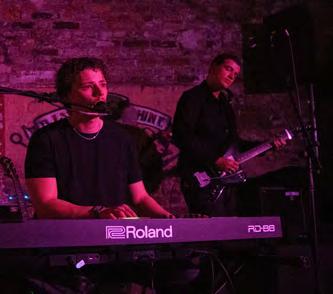
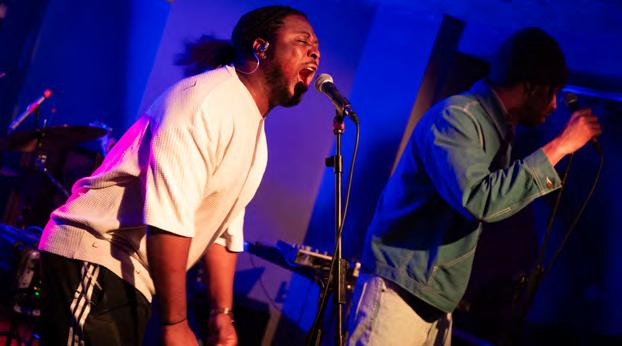












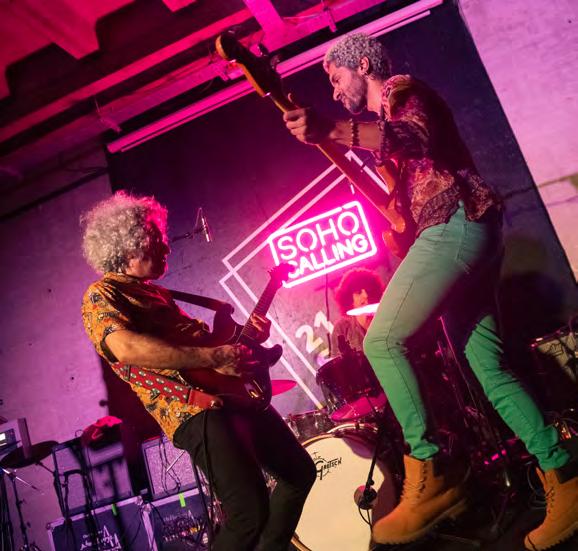







ACurrently celebrating 35 years in music, UTA agent Gary Howard is the undisputed agency king of pop, with a roster that includes Craig David, Steps, N-Dubz, and Zayn Malik. Here, he tells Gordon Masson about his route to the top – from shovelling shit (literally) to becoming the only agent named on The O2 arena industry wall of fame…
s a wayward teenager, Gary Howard was, perhaps, the only person who didn’t know what he was going to do for a living.
“I’m still friends with people I was at school with, and they all tell me that they knew what I’d end up doing for a living because I was obsessed with music: I was always playing music, talking about it, and singing,” he recalls.
School days are best forgotten, however. “I got expelled, sort of, when I was 15. I loved being at school but didn’t take it seriously enough. It was a fun place for me to have a laugh with friends. Plus, I loved sport – I captained the rugby team, got picked to represent my district, and represented the school at football and basketball,” he says. “But after a series of altercations, they told me on January 31st, 1986 that I was suspended until further notice. Then just before my 16th birthday in April, I found a job polishing hotel bathtubs that paid me £80 per week, cash-in-hand. Back in 1986, that was a lot of money. And come Friday night, I was
spending all my money on my mates in the pub, having a great time. So, when the school asked me to go back and do my exams, I couldn’t see the point. I’d missed out on all the coursework, so I felt they were setting me up to fail. But meanwhile, I had a job and was making my own way in life.”
Flitting from job to job, Howard reveals that one of his favourite jobs was also the most disgusting. “We were cleaning up industrial estates – cutting the grass, sweeping the kerbs. Up in Boreham Wood, behind this row of shops that backed onto Elstree Studios, there was an alleyway where we had to clean up dog shit. On those days, you’d always want to be driving the van because the driver would have the keys, meaning they could get into the back first to grab the shovel, because when you were shovelling, you’d deliberately miss the opening of the bag and cover your mates in shit… I think this is why, now, I can handle most things that are thrown at me.
“Even on that job, my mates would accuse me of singing just to try to get discovered, because they then filmed Top of the Pops at Elstree.”
Passionate about music from day one, Howard grew up in the village of Istead Rise in rural Kent before his parents’ divorce saw him move to Gravesend, on the outskirts of London.
“In 1981, I was obsessed with Adam Ant and would play his album, Kings of the Wild Frontier, over and over. Amazing that one day [he would be sitting] in my office asking me to be his agent. My 11-year-old self would have died.
“But I didn’t go to my first concert until I was about 15 – Madonna and Michael Jackson at Wembley Stadium, and then Wembley Arena for Alexander O’Neal, who I also later represented.”
However, his passion for pop meant teenage Howard was a regular “at a lot of underage discos in Gravesend.” Indeed, the town’s DJ alumni included the likes of Eddie Gordon, head of A&R at Polydor, Pete Tong, and Steve Wolfe, was head of A&R at A&M Records.
“These guys really made me find my love of soul music, and they would also host personal appearances [PAs], which really engaged me – artists
Thousands of professionals read IQ every day. Make sure you get the whole picture… SUBSCRIBE HERE


Hanna Ellington talks to the architects behind Gracie Abrams’ The Secret of Us trek to uncover how, in less than five years, the popstar has ascended from her first tour to selling out arenas worldwide.
The first time Gracie Abrams stepped on the Eras Tour stage, she was a rising artist. By the time she took her final bow, she was an undeniable star.
In 2016, Abrams posted a faux album cover with the caption “only for a school project but a girl can dream, right.” If you can dream it, Abrams proves you can do it.
Less than a decade later, her sophomore album, The Secret of Us, would rocket up the global charts, with hits like Close To You and That’s So True going viral across various platforms, including the one she made that wish on.
The whirlwind, worldwide demand that followed her chart-topping LP has been nothing short of remarkable. What started as a theatre-level jaunt has swiftly upgraded to arenas across Europe, Australia, and a second North American leg as Abrams rides an unstoppable trajectory into major venues and fans’ hearts around the world.
With The Secret of Us Tour ’s global trek, Abrams’ intimate-yet-grand performances and stellar songwriting have solidified her place as a voice for the next generation.
Abrams first broke onto the music scene by posting herself singing online. Covers quickly turned into two EPs, and she started her performance career by hosting cosy online “bedroom shows” from her Los Angeles home.
After a run playing grassroots gigs across her native US, and two 320-capacity shows at London’s Omeara, she completed her first international outing in 2022 with the This Is What It Feels Like Tour in support of her second EP. With a sold-out small theatre tour and a stint opening for Olivia Rodrigo under her belt, Abrams released her debut album, Good Riddance, in 2023 and an-
nounced a headline run in support.
“Something was really happening at this point,” says agent Andy Cook of CAA, who has worked with the artist since 2019.
In 2023, Abrams found herself doing double duty, headlining shows across North American, European, and UK theatres while pivoting to open for Taylor Swift on what would become the highest-grossing tour of all time.
“Gracie has spent years building a loyal fanbase, but performing in stadiums on Taylor Swift’s Eras Tour undoubtedly exposed her to an even wider audience,” says Lesley Olenik, Live Nation’s VP of touring.
Tour manager Mackenzie Dunster, who’s been on tour with Abrams since her first in 2021, says she witnessed the profound impact the experience had on the performer she has evolved into.
“Not only did she get a masterclass education from witnessing Taylor and the Eras team operate, but she also got the opportunity to understand how her own performance played in rooms those sizes. She took stock of how different it is to play to large vast crowds. She paid attention to what fans responded to, how to flow and fill the space on a big stage, and what moments musically felt more impactful,” she says.
Abrams then hit Australia in January 2024, where she sold out her biggest venues to date and broke merchandise records in venues across the country, according to Cook. Demand has only ballooned from there.
The Secret of Us dropped in June 2024 to widespread fervour and acclaim, landing on top of the charts in the UK, the Netherlands, Canada, and Australia. She scored her first No. 1 hit with That’s So True off the album, due in part to its virality online.
After the first leg of this support tour, Abrams returned as the final opener of The Eras Tour,
Thousands of professionals read IQ every day. Make sure you get the whole picture… SUBSCRIBE HERE
With a population of more than 85m, the prospects for growing Türkiye’s concerts and event sector are enormous. But as Adam Woods discovers, inflation, taxes, currency exchange, and a lack of indoor venues are hindering progress for the nation’s live entertainment professionals.

Türkiye isn’t necessarily living its very best life in 2025. Exchange rates are weak, inflation high – though far lower than a couple of years ago – and regional and global geopolitics turbulent and troubling.
Striking, however, is the resilience, shrewdness, and pragmatically hopeful outlook of its live sector, which felt the post-Covid benefit and is now surveying the opportunity and keeping a
smart eye on its risk exposure after a mixed 2024.
“I believe 2026 is going to be a good year – I’m hearing a lot of touring plans,” says Zeynep Boyner, head of international event bookings at BKM, the live division of the powerful film and TV production group that is behind one of the few largescale international headline shows of this year: Guns N’ Roses at Istanbul’s BJK Tüpraş Stadium, home of Beşik-
taş football club, in June.
“For this year, we are happy. We are kind of laying low and watching, but I can still book something if something comes up,” she says.
Such is the thinking in Türkiye, where better times are not so far behind and could yet be around the corner. Clearly, there are challenges in the market right now, but equally, anything is possible.
“Local promoters in Türkiye gen-
erally have mixed feelings about the current state of the Turkish music scene,” says Burak Çekiç, booking and programming manager at key venue Blind Istanbul. “On one hand, there’s a growing sense of optimism due to the increasing attention on international alternative, indie, and electronic music and concerts, especially in cities like Istanbul, where a thriving underground scene exists.
“On the other hand, rising opera-

tional costs, inflation, and currency fluctuations make ticket pricing a constant challenge.”
Türkiye is, of course, no stranger to international tours, but homeruns have lately been a little scarce. Scorpions had a notable smash last year at KüçükÇiftlik Park, selling out two shows at the 12,000-cap outdoor space in June for Live Nation and local partner Epifoni Events, while Bryan Adams, Andrea
“If we can get those big tours coming through and figure out a way to set reasonable ticket prices for the young people, I think Türkiye is going to be big”
Zeynep Boyner | BKM
a late surge. Plenty of touring artists still include Istanbul on itineraries – particularly electronic ones, with David Guetta, Massive Attack, and Black Coffee among those to have recently passed through.
“Electronic music is doing very well in Türkiye,” says Boyner. “It used to be a rock country back in the day, but now it’s more of an electronic/pop/hip-hop/rap market.”
But there’s no avoiding the fact that Türkiye today is a complicated live music market. Under President Recep Tayyip Erdoğan’s authoritarian populist regime, cultural activities are not well supported, and alcohol licences, curfews, LGBTQ+ rights, and taxes – 20% VAT plus 25% withholding tax for international productions – present frequent complications.
Famously poised between east and west, in 2025, Türkiye finds itself in a diplomatic position of some significance. Neither exactly a friend nor a foe to many of its European neighbours, having been rebuffed for membership of the European Union over many decades, Türkiye has latterly emerged as a well-placed potential intermediary between Russia and its adversaries – though Türkiye’s interest in peace in Ukraine and Syria is set against a chequered human rights record of its own.
Charmenko. “We have a very high inflation rate, so people have less purchasing power, and at a certain point, that really starts to hit the entertainment market.
“The country trundles on and life goes on as usual – people go to the shops and they go to work. Unemployment isn’t particularly high, but it’s more that salaries have been eaten into.”
This cocktail of soft spending and rising costs makes international bookings a tricky – and sometimes impossible – balancing act.
“When we look at the artists we presented ten years ago,” says Piu Entertainment managing partner Cemil Demirok, “let’s say we paid 400k for an artist, and we did that show in a 2,000-capacity venue, and it worked. Now, there’s no way. Even if you sell out a 10,000-capacity venue, it’s not going to work financially because the buying power is getting worse, but production costs, venue rentals, flights, hotels have all gone up.
“We do shows in London and in Istanbul, and the cost is higher in Istanbul compared to London, but the average ticket price is less in Istanbul.”
Bocelli, Bruce Dickinson, Louis Tomlinson, Judas Priest, and Ludovico Einaudi all filed through.
This year, things are undoubtedly quieter from an international perspective, while certainly not at a standstill. Both BKM’s Guns N’ Roses show and DBL Entertainment/ Akademi Organizasyon’s Robbie Williams concert at the Festival Park in October report pretty good initial sales, with the expectation of
But for all the upheaval in the broader region and on its own soil, the biggest barrier to Turkish touring volumes is largely of the economic kind: a painfully weak exchange rate, galloping inflation, and several years of tough conditions that may or may not be beginning to turn around.
“Türkiye is in a slow-burn economic crisis that has been going on, really, since about 2016,” says Nick Hobbs, founder of Istanbul-based booking agency group and promoter
Disasters have also been frequent in recent years, from the devastating earthquake in southern and central Türkiye two years ago to the hotel fire at the Kartalkaya Ski Resort in January, and national days of mourning for such events also necessitate show cancellations.
“The political and social unbalance affects people, especially for international bookings,” says Hatice Arıcı, programmer at Istanbul’s Zorlu Performing Arts Centre (Zorlu PSM). “When you announce a festival or a big event that you put so much money and time and effort and hope into, there is no guarantee
Thousands of professionals read IQ every day. Make sure you get the whole picture… SUBSCRIBE HERE